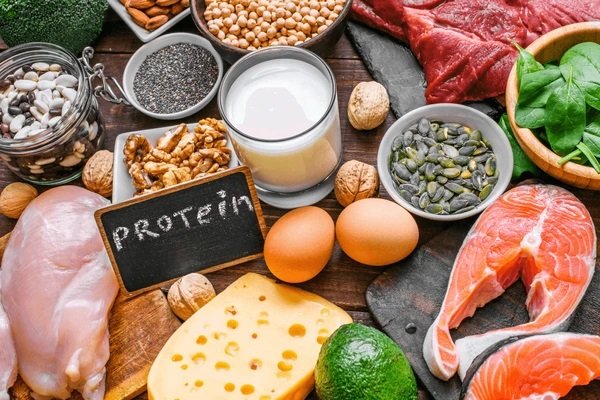
Protein myths busted: Why you need more protein, not less

27
Feb
Protein Myths Busted: Why You Need More Protein, Not Less
Introduction:
The Fear Around Protein in India
Despite being an essential macronutrient, protein has been wrongly demonized in India. Many people believe that high protein intake leads to kidney damage, digestion issues, or weight gain—but the reality is far from it.
The truth? Most Indians, including vegetarians and non-vegetarians, consume far less protein than required. This deficiency is directly linked to poor muscle tone, slow metabolism, hair fall, weak immunity, and skin issues. If anything, our diets lack protein so much that toxicity is nearly impossible for a healthy person.
Let’s break down the most common protein myths and why including enough protein in your diet is crucial for weight loss, gut health, and overall well-being.
Myth 1: “Protein Causes Kidney Damage”
One of the biggest misconceptions is that eating more protein will damage the kidneys. This myth stems from misunderstanding how kidneys function.
The Reality:
In a healthy individual, protein does not harm the kidneys.
The concern arises only in people with pre-existing kidney disease, where protein metabolism puts extra load on already damaged kidneys.
For healthy people, studies show that even high-protein diets (1.6–2.2g per kg of body weight) are completely safe.
👉 Fact: Lack of protein, not excess protein, is a bigger issue. Without adequate protein, muscle loss, fatigue, slow metabolism, and poor immunity are common.
Myth 2: “I Get Digestion Issues After Eating Protein”
Many people say they experience bloating, heaviness, or discomfort after increasing protein intake.
The Reality:
The real issue is poor gut health—not protein.
Many Indians consume low fiber, high-carb, and low-protein diets, which weakens digestion over time.
When they suddenly increase protein, their gut struggles to adapt.
👉 Solution: Pair protein-rich foods with fiber sources like vegetables, fruits, and fermented foods to improve digestion. If you experience bloating, it’s your gut that needs fixing—not the protein.
Myth 3: “Our Indian Diet Has Enough Protein”
Traditional Indian meals are rich in carbohydrates but extremely low in protein. Most people don’t even meet the minimum daily protein requirement.
The Reality:
A sedentary person needs 0.8g of protein per kg of body weight, while those who work out need 1.2–2g per kg.
Typical Indian diets provide only 30–40g of protein daily, far below the requirement.
Relying solely on dal, curd, or nuts won’t meet your protein needs unless portions are significantly increased.
👉 Fact: Indians need to actively add protein-rich foods like paneer, tofu, lentils, soya, eggs, or dairy-based protein supplements to meet their daily needs.
Myth 4: “Non-Vegetarians Get Enough Protein”
Many people assume that just because they eat eggs, chicken, or fish occasionally, they’re getting enough protein.
The Reality:
Most non-vegetarians in India do not consume protein-rich foods daily or in sufficient quantities.
A typical diet includes more carbs and fats than protein.
Even daily egg consumers often stop at 1 egg per day, which provides only 6g of protein—far below the daily requirement.
👉 Fact: Eating non-veg occasionally isn’t enough. Proper meal planning is required to ensure daily adequate protein intake.
Myth 5: “Protein Supplements Are Steroids”
A common fear is that whey protein powders are harmful or unnatural.
The Reality:
Whey protein is derived from milk—it’s just a concentrated, high-quality protein source.
It is not a steroid—it is simply a supplement to help meet daily protein intake.
We at Midas Wellness Hub recommend dairy-based protein supplements (like whey or casein) when required, as they are superior in amino acid profile.
👉 Fact: If your diet lacks sufficient protein, adding a high-quality protein supplement can help without any side effects.
Protein & Weight Loss: Why It’s Essential
Protein is the most important macronutrient for weight loss. It helps in:
✅ Boosting metabolism (burns more calories than carbs or fats)
✅ Reducing hunger & cravings (keeps you full longer)
✅ Preserving muscle while losing fat (prevents weakness)
✅ Preventing weight regain (helps maintain fat loss)
At Midas Wellness Hub, we don’t just focus on external weight loss treatments—we emphasize a complete approach that includes diet correction, protein optimization, and gut health improvement.
What We Do at Midas Wellness Hub for Weight Loss
To ensure sustainable fat loss, we offer:
Customized Diet Plans with high-protein, balanced meals
Metabolic Boosting Therapies
Non-invasive Fat Reduction Treatments like RF (Radiofrequency) and Crymozas
Personalized Supplementation Guidance to correct deficiencies
Gut Health Optimization to improve digestion and nutrient absorption
👉 Fact: If you want sustainable weight loss, you must include protein in your diet while supporting your metabolism with scientifically backed treatments.
Final Thoughts: Don’t Fear Protein—Fix Your Diet Instead
Protein doesn’t harm your kidneys, doesn’t cause bloating on its own, and is the key macronutrient for fat loss. If you’ve been avoiding protein due to these myths, it’s time to change your approach.
If you’re looking to improve weight loss, gut health, or muscle tone, visit Midas Wellness Hub for a personalized consultation and a scientifically designed approach to meet your goals!
📍 Ready to Fix Your Diet & Lose Weight the Right Way? Visit Midas Wellness Hub Today!
FAQs
Sedentary individuals: 0.8g per kg of body weight
Active individuals: 1.2–2g per kg of body weight.
No, unless you have pre-existing kidney disease.
Paneer, tofu, soya chunks, lentils, chickpeas, nuts, seeds, and dairy products.
Eat more dairy-based proteins, increase paneer and lentil intake, and add protein-rich snacks.
Yes! It boosts metabolism, reduces hunger, and prevents muscle loss.




